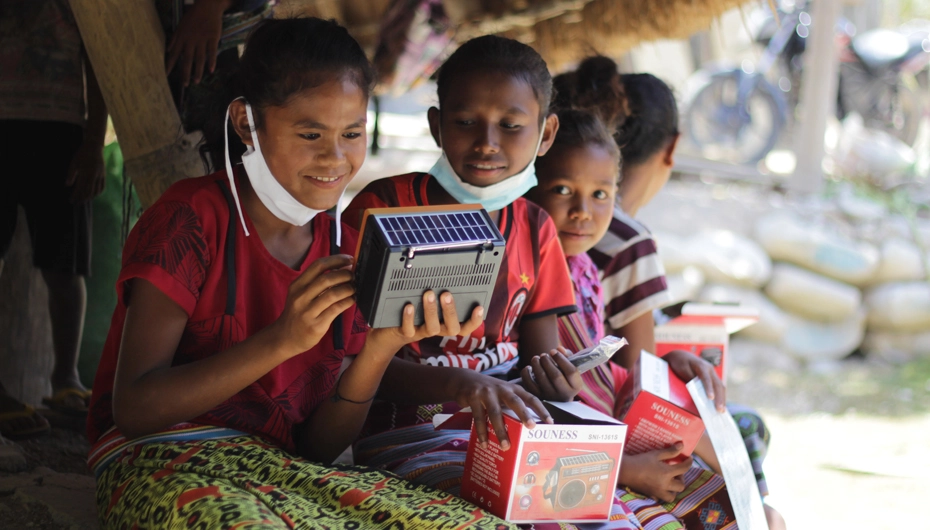Media Centre - Opinion Piece - 17 March 2021
Let’s look beyond our own borders to help lift girls’ education

As Australia emerges from the worst impacts of COVID-19 and our lives start to return to some semblance of normality, it’s vital we keep the devastating impacts of the virus on others in our region at the top of our minds – especially girls wishing to finish their education.
I was the first person in my family to complete university and even finish high school. My mum worked two jobs to ensure my three sisters and I were educated.
I know I wouldn’t be the woman I am today if I didn’t have my education. And because of that, I feel a deep responsibility to make sure girls everywhere have the same opportunities.
Education is everything. It unlocks doors and dreams, and unleashes potential.
With the 12-month anniversary since the first lockdowns in March last year, Plan International Australia will tomorrow release a ground-breaking report Smart, Successful, Strong – the Case for Investing in Adolescent Girls’ Education in Aid and COVID-19 Response and Recovery, along with a a survey of 450 adolescent girls in the Asia-Pacific region to better understand how the coronavirus pandemic has impacted on their education.
As the charity for girls’ equality, Plan International Australia has chosen to make adolescent girls the focus of this research because of the challenges that come with both their age and gender.
COVID-19 has placed a spotlight on the gendered norms and expectations that exist to hold girls back and deny them both opportunities and choices to pursue their education.
Girls aged 15-19 are at a crossroads in terms of the trajectory of their lives.
It is often a time when families make decisions regarding girls’ education, marriage and other rights and freedoms.
The research reveals that many girls in our region had their schooling seriously disrupted as a result of the pandemic, with many diverted into household duties, and others subject to forced early marriages or increased incidents of domestic violence.
It also demonstrates how online study was near impossible for the 59 per cent of girls who shifted to learning from home.
Of these girls, 60 per cent had unreliable internet, 29 per cent felt unsafe online and close to 20 per cent of girls said they couldn’t access devices such as tablets or computers to learn.
Sadly, these disruptions to education have had a profound impact on girls’ mental and emotional wellbeing.
Girls in our workshops spoke of stressful home environments where parents were unable to support their learning, the struggle to prepare for exams and heightened concern about their futures.
On top of that, we learnt about a spike in calls to domestic violence helplines in South East Asia and the Pacific due to COVID-19.
In Bangladesh, a study revealed that beatings by parents or guardians had increased by 42 per cent, calls to the child helpline rose by 40 per cent, and 50 per cent of those interviewed said the safety and security of girls was an issue in lockdown.
These problems are serious impediments to the advances made in education over the past decades.
A recent Gates report concluded that COVID-19 may have set back children’s education by a generation.
On top of that, an Education Financing Watch report just released by the World Bank and UNESCO found two thirds of the poorest countries in the world have cut their education budgets since the beginning of the pandemic – precisely at the time they need to be increasing it to meet the impacts of the virus of girls and children’s education.
Australia remains a relatively rich country, and there are tangible steps the Australian government can and should be taking to mitigate the impacts of COVID-19 on girls’ education outcomes.
As we approach the federal budget later this year, now is the time for Australia to redouble its efforts as champion of girls’ education by increasing its commitment to the Global Partnership for Education as well as prioritising girls’ access to secondary education as part of its COVID-19 response and recovery plan in the region.
When girls have the chance to be educated, the barriers they face to equality are much easier to break – both for themselves and for future generations.
Educating girls is one of the most effective – and most overlooked – ways to mitigate climate change, improve employment opportunities, and lift entire communities out of poverty; and it provides opportunities for girls to be heard and to lead.
Susanne Legena is chief executive of Plan International Australia, the charity for girls’ equality. This piece first appeared in the Canberra Times
Media contacts


